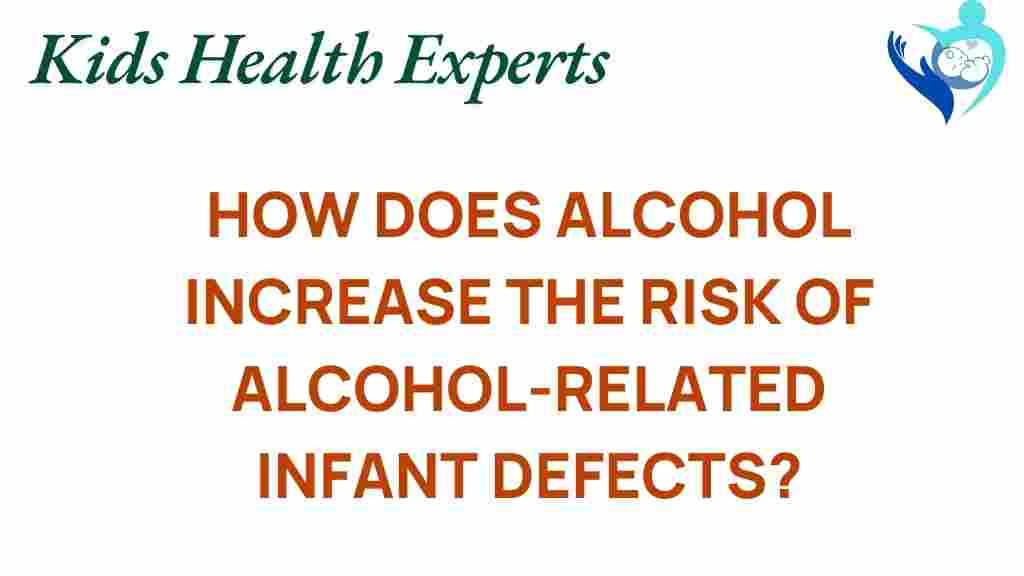Unveiling the Link: How Alcohol Elevates Risks of Infant Defects
Understanding the impact of alcohol on fetal development is crucial for ensuring the health of both mothers and their infants. During pregnancy, the choices made can have lasting effects, and the consumption of alcohol is one of the most significant health risks. This article will explore the connection between alcohol and infant defects, emphasizing the importance of prenatal care and awareness surrounding maternal health.
The Impact of Alcohol on Fetal Development
Alcohol is a teratogen, meaning it can cause developmental problems in a fetus. When a pregnant woman consumes alcohol, it passes through the placenta to the developing baby, affecting its growth and development. Here are some critical points regarding the impact of alcohol on fetal development:
- Alcohol’s Effects on Cell Development: Alcohol interferes with the formation of cells and can lead to malfunctioning or dying cells.
- Brain Development: Alcohol exposure can severely affect brain development, leading to cognitive impairments and behavioral issues.
- Physical Growth: Infants exposed to alcohol may experience growth deficiencies and distinctive facial features associated with fetal alcohol syndrome.
Understanding Infant Defects
Infant defects are abnormalities present at birth that can affect a child’s health, development, and quality of life. Some common types of infant defects linked to alcohol consumption include:
- Fetal Alcohol Spectrum Disorders (FASD): A range of effects that can occur in an individual whose mother drank alcohol during pregnancy.
- Physical Abnormalities: These may include heart defects, limb malformations, and facial deformities.
- Neurological Issues: This may encompass developmental delays, learning disabilities, and behavioral problems.
The Importance of Awareness in Maternal Health
Awareness is essential in promoting maternal health and preventing infant defects. Here are some ways to increase awareness:
- Educational Programs: Implementing programs that educate expectant mothers about the risks of alcohol during pregnancy.
- Community Outreach: Engaging communities in conversations about alcohol’s impact on infant health.
- Healthcare Provider Training: Ensuring that healthcare providers are equipped to discuss alcohol consumption with pregnant patients.
Public Health Initiatives and Their Role
Public health initiatives play a vital role in reducing the incidence of infant defects caused by alcohol consumption. Some effective strategies include:
- Awareness Campaigns: Running campaigns that inform the public about the dangers of alcohol during pregnancy.
- Support Groups: Establishing support groups for pregnant women struggling with addiction.
- Policy Changes: Advocating for policies that limit alcohol advertising and availability, especially targeting pregnant women.
Step-by-Step Process: How to Avoid Alcohol During Pregnancy
It’s crucial for expectant mothers to take proactive steps to avoid alcohol consumption. Here’s a step-by-step guide:
- Understand the Risks: Educate yourself about how alcohol affects fetal development and the potential for infant defects.
- Make a Commitment: Decide to abstain from alcohol during pregnancy and communicate this decision with your partner and family.
- Seek Support: Join support groups or seek counseling if you find it challenging to abstain from alcohol.
- Consult Healthcare Providers: Regularly visit your healthcare provider for prenatal care and discuss any concerns about alcohol consumption.
- Stay Informed: Keep up to date with information about prenatal health and development.
Common Troubleshooting Tips for Expectant Mothers
If you are struggling with alcohol consumption during pregnancy, consider the following troubleshooting tips:
- Identify Triggers: Recognize situations or emotions that prompt you to drink and develop strategies to cope with them.
- Use Alternatives: Find non-alcoholic beverages that you enjoy to replace alcoholic ones during social gatherings.
- Set Boundaries: Avoid environments where alcohol is the main focus, especially during your pregnancy.
- Communicate: Share your decision to abstain from alcohol with friends and family so they can support you.
The Role of Prenatal Care in Preventing Infant Defects
Prenatal care is an essential aspect of maternal health that can significantly reduce the risks of infant defects. Regular check-ups allow healthcare providers to monitor the mother’s health and the baby’s development. Key components include:
- Regular Screenings: These can identify potential health issues early on.
- Nutritional Guidance: A healthy diet can mitigate some risks associated with alcohol exposure.
- Substance Abuse Counseling: Access to counseling can help mothers who struggle to abstain from alcohol.
Conclusion: The Path Forward
The link between alcohol and infant defects is significant, and understanding this connection is vital for the health of future generations. Through increased awareness, public health initiatives, and robust prenatal care, we can reduce the risks associated with alcohol consumption during pregnancy. It is essential that expectant mothers are empowered with the knowledge to make informed choices that promote their health and the health of their infants.
For further information on maternal health and the effects of alcohol during pregnancy, visit CDC’s Fetal Alcohol Spectrum Disorders page. Additionally, consider reaching out to local healthcare providers for support and resources.
For more insights on related topics, check our article on healthy prenatal practices.
This article is in the category Conditions and created by KidsHealthExperts Team
